Sebekhotep VII
De Wikipedia, la enciclopedia libre
Merkara Sebekhotep, o Sebekhotep VII, fue un faraón de la dinastía XIII de Egipto, que gobernó de c. 1646 a 1644 a. C.[1]
Su nombre, Merka... Sebek...ja, está inscrito en un fragmento del Canon Real de Turín, en el registro VII, 8, indicando que reinó dos años. Después de este soberano, en el Canon Real faltan los fragmentos de, al menos, cuatro nombres e incluso el resto de la columna VII no es de fácil lectura e interpretación.
Como su predecesor, Seuadykara Hori, este soberano podría ser contemporáneo y lacayo de Mersejemra Ined, que gobernaría desde Tebas sobre parte del Alto Egipto.
A pesar de eso, la situación de Egipto en esta fase histórica puede sintetizarse con suficiente seguridad. Toda la parte del Medio y Bajo Egipto está bajo control directo de los soberanos de dinastía XV, de Avaris, los gobernantes semíticos llamados hicsos, y de gobernadores de la dinastía XVI; o indirecto de los últimos soberanos de la dinastía XIV. Es posible que incluso los gobernantes del Alto Egipto (los últimos soberanos de la dinastía XIII y primeros soberanos de la dinastía XVII) sean tributarios de los citados Grandes Hicsos (dinastía XV) e incluso que surgieran manifestaciones de división interna.
Contenido |
Testimonios de su época [editar]
- Su nombre figura en el Canon Real de Turín y la Lista Real de Karnak.
- Inscrito en el sello nº UC16591 del Museo Petrie.
- Dos estatuas de Karnak.[2]
Titulatura [editar]
| Titulatura | Jeroglífico | Transliteración (transcripción) - traducción - (procedencia) |
| Nombre de Nesut-Bity: |
| mr k3.u rˁ (Merkaura) Amados son los espíritus (Ka) de Ra (Museo del Louvre nº A131) |
| Nombre de Nesut-Bity: |
| mr k3.u rˁ (Merkaura) Amados son los espíritus (Ka) de Ra (Lista Real de Karnak nº 42) |
| Nombre de Nesut-Bity: |
| mr... k3 ḫˁ sbk... (Mer... ka [ja] Sebek [Hotep]) Amado es el espíritu (Ka) de ... Sobek ... (Canon Real de Turín nº 7,8) |
| Nombre de Sa-Ra: |
| sbk ḥtp (Sebek Hotep) Sobek está satisfecho (Museo del Louvre nº A131) |
Referencias [editar]
Bibliografía [editar]
- Franke, Detlef (1983). Altägyptische Verwandtschaftsbezeichnungen im mittleren Reich. Ed. Borg. ISBN 3921598133.
- von Beckerath, Jürgen (1964). Untersuchungen zur politischen Geschichte der zweiten Zwischenzeit in Ägypten. Ed. J.J. Augustin, pp. cap. 61, pp. 254-255. ISBN 3870300590.
- Ryholt, Kim (1997). The Political Situation in Egypt During the Second Intermediate Period. Ed. Museum Tusculanum Press, pp. cap. 390 (archivo 16/a). ISBN 8772894210.
| Predecesor: Hor II | Faraón Dinastía XIII | Sucesor: . . . Dedumes |
En otros idiomas
| |
Galeria de Hans Ollermann
Deir el-Medina.
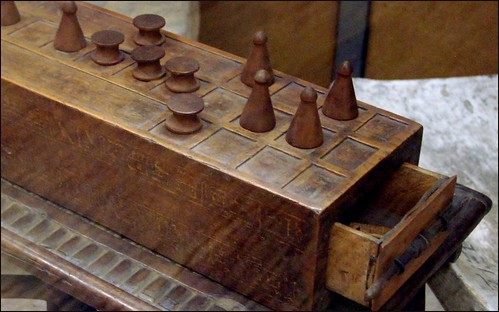
Game of draughts with a little drawer to hold the pieces. From the Tomb of Kha (TT8), Deir el-Medina.
Dynasty XVIII, Reign of Amenhotep II, Tuthmose IV, & Amenhotep III.
(text Su, London)
Tomb of Kha and his wife Merit.
Kha was architect of the Pharaoh (Amenhotep II 18th Dynasty) and responsible for building projects not just in the reign of Amenhotep II, but also in the reign of 3 or 4 kings: Tuthmosis III, Amenhotep II, Tuthmosis IV and Amenhotep III
The intact tomb was discovered by E. Schiaparelli in 1906.
The access shaft to the funerary chamber was neither located in the chapel nor in the courtyard, but at a certain distance from both.
The collapse of a nearby Ramesside tomb had hidden it completely, thus preserving the burial intact through the course of 33 centuries.
A staircase led to a corridor and ante-chamber.
The funerary provisions were placed here because there was no room in the burial chamber itself at the time of the burial.
A bed, two baskets, two amphora's and a chair were also in this ante-chamber.
The entrance to the funeral chamber was blocked by a heavy wooden door that was closed on the in-side.
The chamber itself was rectangular with smooth plastered walls.
The great rectangular sarcophagi were inside, placed along the walls and covered with linen sheets.
A statue of Kha was on a chair, which stood in front of the sarcophagus of Merit.
It was garlanded with flowers.
Egyptian Museum, Turin.
Comentários
Hans Ollermann  disse:
disse:
Nou en of.
Graag gedaan, Eelco.
Postado 20 meses atrás. ( permalink )
Hans Ollermann  disse:
disse:
Thanks John. I was a little bit surprised that the photo was OK. The light conditions in some parts of the museum are more than excellent but not in the Kha room, Too much glass that reflects a lot. Postado 20 meses atrás. ( permalink )
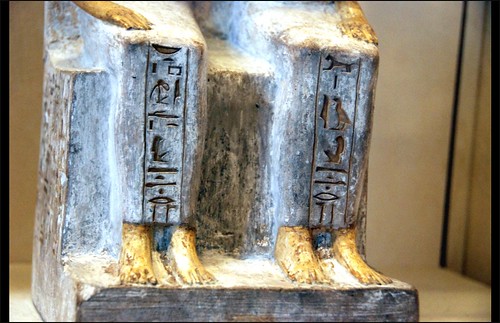
Painted Group.
From Deir el-Medina.
Schiaparelli excavations.
18th dynasty.
Limestone.
C.3056.
Egyptian Museum, Turin.
2008_0610_133624AA Egyptian Museum, Turin
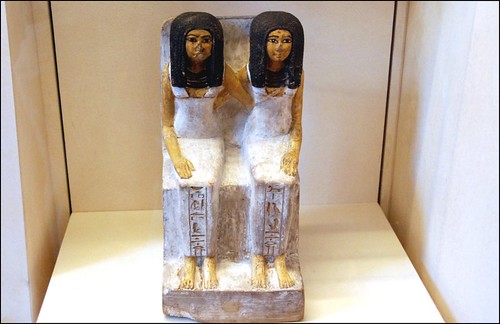
Painted Group.
From Deir el-Medina.
Schiaparelli excavations.
18th dynasty.
Limestone.
C.3056.
Egyptian Museum, Turin.
See also my list of best and worst museums in the world:
www.flickr.com/photos/menesje/4059308291/
And here you find my list of best and worst museums in Holland:
www.flickr.com/photos/menesje/4059604700/
Comentários
Lenka P  disse:
disse:
A double statue of two private ladies: that is quite rare, isn't it? (the one on the left is the mistress of the house, what is the other one, please?) Postado 20 meses atrás. ( permalink )
2008_0610_133710AA Egyptian Museum, Turin
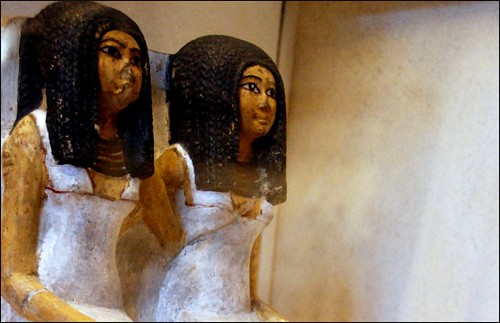
Painted Group.
From Deir el-Medina.
Schiaparelli excavations.
18th dynasty.
Limestone.
C.3056.
Egyptian Museum, Turin.
2008_0610_133618AA Egyptian Museum, Turin
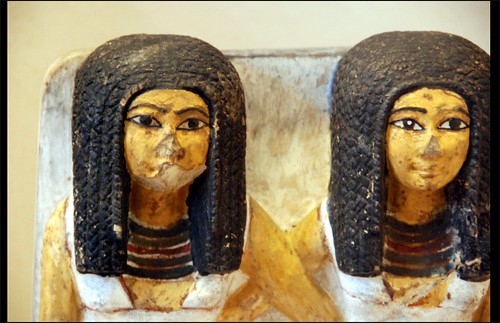
Painted Group.
From Deir el-Medina.
Schiaparelli excavations.
18th dynasty.
Limestone.
C.3056.
Egyptian Museum, Turin.
2008_0610_161058AA Egyptian Museum, Turin
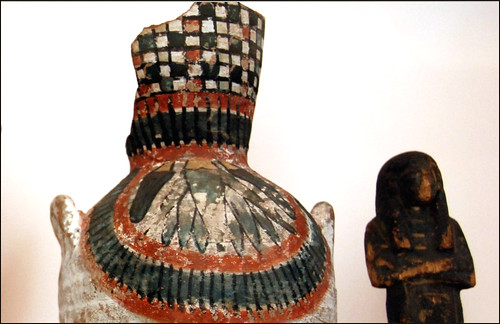
Vessel with floral decoration.
From Deir el-Medina.
Dynasty XIX (1292-1186 B.C.)
Egyptian Museum, Turin.












![X1 [t] t](http://es.wikipedia.org/w/extensions/wikihiero/img/hiero_X1.png)
![Q3 [p] p](http://es.wikipedia.org/w/extensions/wikihiero/img/hiero_Q3.png)

smiling_da_vinci disse:
disse:
Wat is dit mooi bewaard gebleven. En bedankt voor de achtergrond info.
Postado 20 meses atrás. ( permalink )